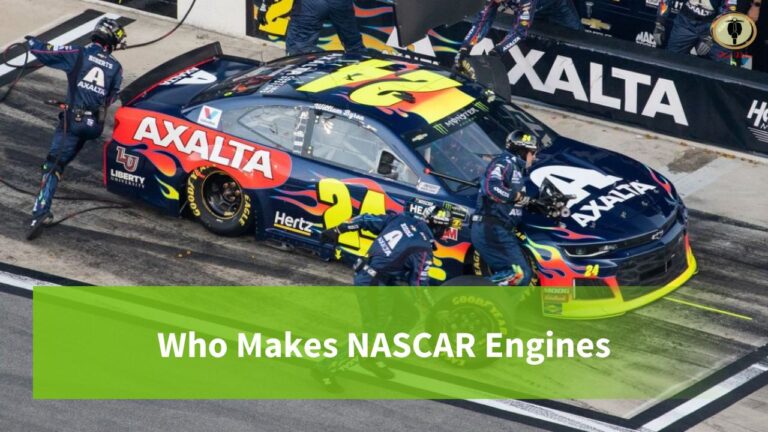NASCAR is the “governing body” for stock car racing, and it started in 1948. They have used different engine configurations over the years. Hendrick Motorsports and Richard Childress Racing are the leading builders of Chevy NASCAR engines. However, when talking about who makes NASCAR Engines, you will learn later in this article.
Who makes NASCAR Engines:
There are at least four different manufacturers that make NASCAR Engines. Here you will learn about these manufacturers:
Chevrolet
Chevrolet is one of the companies that makes NASCAR engines. GM founded it in 1911. It was initially called the Chevrolet Division of General Motors Company. The company makes blocks for cars that race, like NASCAR.
Toyota
Toyota’s development team makes NASCAR engines. They make 350-400 of them each year. They have worked with 6 NASCAR teams to make perfect engines for them.
Ford
In 2012, Ford launched its FR9 NASCAR engine with 800 horsepower. This engine was also utilized in the Monster Cup series, the X-infinity series, and The Gander outdoor truck series, among other events. This engine is based on the FR9 model.
Dodge
Dodge became partners with NASCAR in 2012. They tried to get into NASCAR in 1999, but they didn’t find a good enough team to race on the tracks. Even though Dodge is a partner with NASCAR, it still does not have its engines used on the official race track because of its strict policy on engines.
NASCAR History
NASCAR was started in February of 1948. William France Sr. and other drivers founded it at the time. There were three classes: Modified, Roadster, and Stock. The Modified and Roadster classes were better for fans because they had more action than Stock.
Who makes NASCAR Cars?
Toyota, Ford, and Chevrolet are the three NASCAR vehicle manufacturers. So when you see a NASCAR race, the chances are that the car has been entered into it by one of these manufacturers.
Are NASCAR Engines Any Good?
They’re a high RPM, low-torque engine with a reasonably broad powerband. Their primary features are that they produce a large amount of power with restrictions on the air intake system, and they are very dependable in high continuous RPM operation.
NASCAR Engines:
The current vehicles are EFI V8-powered, having used carburetion as fuel feed for the past 62 years with compacted graphite iron blocks and pushrod valvetrains operating two valves per cylinder, and have a 358 cubic inch (5.9-liter) displacement limit.
NASCAR Engines Reliability
Most production car engines are designed to last more than 100,000 miles. However, NASCAR race car engines are only meant to last for one race (500 miles). So after each race, the engine is rebuilt.
When Your Car Engine Needs a Replacement?
Here are several ways to tell you if your car needs an engine replacement:
- Your car has trouble starting
- Your car doesn’t accelerate quickly
- Your car makes a knocking noise when it runs
- Your car smells like gasoline
But here are some ways to tell in detail:
1. Knocking Noises
If you hear a knocking sound coming from your engine, probably, the engine bearings aren’t receiving enough lubrication. They can seize and stop functioning correctly as a result of this. The failure of the engine bearings caused by excessive mileage is another possibility. The engine bearings keep the engine’s moving components in motion; if they stop working correctly, the entire engine may need to be replaced.
2. Loss of performance
If your automobile is slow to accelerate, has a harsh engine idle, or struggles to start, there could be an issue with the engine—possibly many things like faulty sensors or clogged filters. Before you eliminate mechanical engine trouble as a possibility, take the car for a spin on the street and have it evaluated by a mechanic. This will assist in determining the source of the problem.
3. High Fuel consumption
If you are experiencing higher than normal fuel consumption, or your car isn’t running as efficiently as it used to, then there could be an issue with the engine. The most common explanation for reduced vehicle efficiency is clogged filters. However, if filters are not the problem, then you should have a mechanic take a look at the engine and do some testing on it.
4. Your engine is stutters or stalls
If your car starts to stall or stutter when you accelerate, it might be a sign that the engine has lost some of its ability to keep the car running smoothly. The inner of the engine may have excessive wear or it could be malfunctioning.
5. Thick smoke
Read the details below.
Car Exhaust Smoke Colors
An engine failure will often result in colorful smoke coming out of your car’s tailpipe. The telltale indication that there is indeed a problem with this vital component has been given by the material itself, which can be seen as white or black clouds flickering before our very eyes; it might even leave behind sooty deposits on windows where they’ve rolled off onto during heavy acceleration sessions!
Does Smoke Color Identifies Car’s Health?
Knowing the color of smoke coming from your car is important for diagnosing issues. The better diagnosis you can make, the faster it will be repaired and get back on track with driving!
White Smoke (It is Normal)
The water vapor in your car’s exhaust is the reason for white smoke when it starts up. This can be especially obvious on chilly days, as condensation builds up and produces thin or light-colored streams of visible gas from every tailpipe!
Blue Or Gray Exhaust Smoke (Isn’t Considered Normal)
You can tell what’s going on with your car by the color of its exhaust smoke. If it looks like there might be an oil leak, you need to get in touch with a professional as soon as possible and have them check for any leaks before they worsen into something more serious!
Black Exhaust Smoke (Something Serious)
The car might be burning more fuel than usual because of a clogged air filter, faulty injection system, or other problems. If you notice black exhaust smoke coming out from your vehicle’s engine compartment, then this could mean one thing- there is some sort of trouble with its performance and needs to get checked immediately!
Persistent, Milky White/gray Exhaust Smoke (Serious)
When you notice a thick white/gray plume coming out of your tailpipe, it may be an indication that there’s something wrong with the head gasket. The coolant would heat up in combustion chambers and then blow out as steam through these pipes during the start-up procedure, leading to overheating if not fixed quickly enough!
If smoke is coming from your exhaust system, you likely have a problem with your engine. One possible issue is a cracked block or cylinder head. Make sure to take care of the problem as soon as possible!
How NASCAR Engine differs from different Engines?
The NASCAR engines feature extremely aggressive cam profiles, opening the intake valves much sooner and keeping them open longer than street vehicles. This allows more air to be crammed into the cylinders at high speeds, mainly because of the large intake valve openings.
Power Potential
Today’s NASCAR racecars have engines that produce upwards of 750 horsepower without the use of superchargers or particularly exotic components.
Why You Want One
A NASCAR race is, without a doubt, one of the most exciting series to attend. With most races taking place on oval tracks that provide spectators with views of the whole event, a NASCAR lover will never be disappointed in seeing the action. There are no other motorsports with as lovely a view as a NASCAR race.
Frequently Asked Questions
Here are some questions and answers to help you more about the NASCAR Engines:
Where are NASCAR Cars made?
The NASCAR cars are manufactured by many manufacturers, which you learned in this article, so these are manufactured in different locations worldwide.
Who Owns NASCAR?
The Jim France is the CEO of NASCAR.
Conclusion:
NASCAR engines are unique in that they are designed to only last for one race and must be rebuilt after each race. They are different than other engines because of their aggressive cam profiles, which allow more air to be crammed into the cylinders. This results in a powerful engine that can produce up to 750 horsepower. NASCAR engines are used in different racing series, making them popular for motorsports fans.

